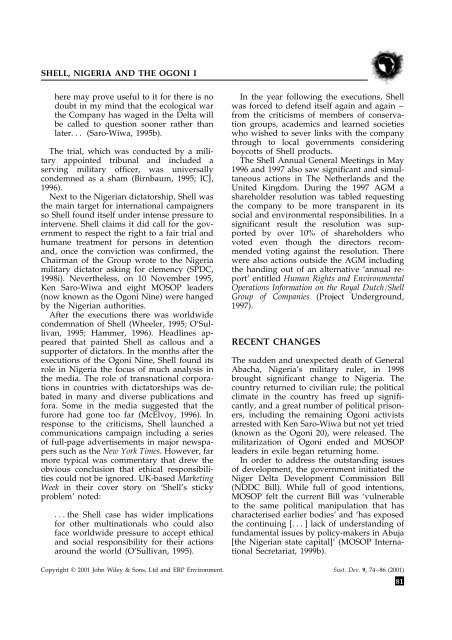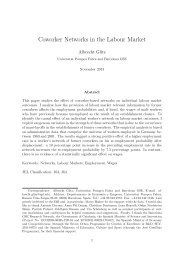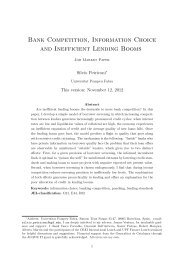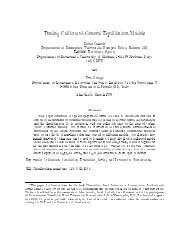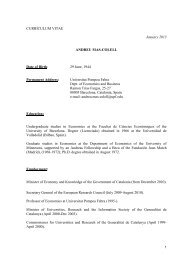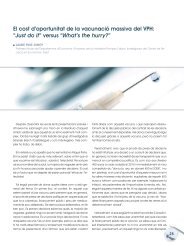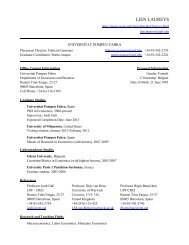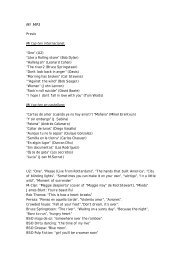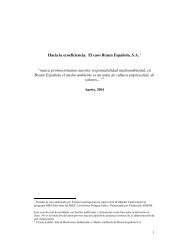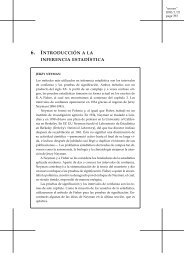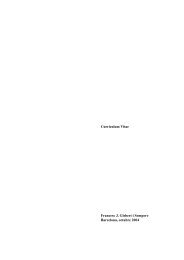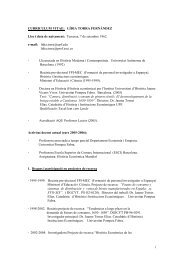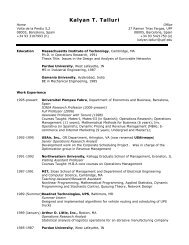SHELL, NIGERIA AND THE OGONI. A STUDY IN UNSUSTAINABLE ...
SHELL, NIGERIA AND THE OGONI. A STUDY IN UNSUSTAINABLE ...
SHELL, NIGERIA AND THE OGONI. A STUDY IN UNSUSTAINABLE ...
Create successful ePaper yourself
Turn your PDF publications into a flip-book with our unique Google optimized e-Paper software.
<strong>SHELL</strong>, <strong>NIGERIA</strong> <strong>AND</strong> <strong>THE</strong> <strong>OGONI</strong> I<br />
here may prove useful to it for there is no<br />
doubt in my mind that the ecological war<br />
the Company has waged in the Delta will<br />
be called to question sooner rather than<br />
later. . . (Saro-Wiwa, 1995b).<br />
The trial, which was conducted by a military<br />
appointed tribunal and included a<br />
serving military officer, was universally<br />
condemned as a sham (Birnbaum, 1995; ICJ,<br />
1996).<br />
Next to the Nigerian dictatorship, Shell was<br />
the main target for international campaigners<br />
so Shell found itself under intense pressure to<br />
intervene. Shell claims it did call for the government<br />
to respect the right to a fair trial and<br />
humane treatment for persons in detention<br />
and, once the conviction was confirmed, the<br />
Chairman of the Group wrote to the Nigeria<br />
military dictator asking for clemency (SPDC,<br />
1998i). Nevertheless, on 10 November 1995,<br />
Ken Saro-Wiwa and eight MOSOP leaders<br />
(now known as the Ogoni Nine) were hanged<br />
by the Nigerian authorities.<br />
After the executions there was worldwide<br />
condemnation of Shell (Wheeler, 1995; O’Sullivan,<br />
1995; Hammer, 1996). Headlines appeared<br />
that painted Shell as callous and a<br />
supporter of dictators. In the months after the<br />
executions of the Ogoni Nine, Shell found its<br />
role in Nigeria the focus of much analysis in<br />
the media. The role of transnational corporations<br />
in countries with dictatorships was debated<br />
in many and diverse publications and<br />
fora. Some in the media suggested that the<br />
furore had gone too far (McElvoy, 1996). In<br />
response to the criticisms, Shell launched a<br />
communications campaign including a series<br />
of full-page advertisements in major newspapers<br />
such as the New York Times. However, far<br />
more typical was commentary that drew the<br />
obvious conclusion that ethical responsibilities<br />
could not be ignored. UK-based Marketing<br />
Week in their cover story on ‘Shell’s sticky<br />
problem’ noted:<br />
. . . the Shell case has wider implications<br />
for other multinationals who could also<br />
face worldwide pressure to accept ethical<br />
and social responsibility for their actions<br />
around the world (O’Sullivan, 1995).<br />
In the year following the executions, Shell<br />
was forced to defend itself again and again –<br />
from the criticisms of members of conservation<br />
groups, academics and learned societies<br />
who wished to sever links with the company<br />
through to local governments considering<br />
boycotts of Shell products.<br />
The Shell Annual General Meetings in May<br />
1996 and 1997 also saw significant and simultaneous<br />
actions in The Netherlands and the<br />
United Kingdom. During the 1997 AGM a<br />
shareholder resolution was tabled requesting<br />
the company to be more transparent in its<br />
social and environmental responsibilities. In a<br />
significant result the resolution was supported<br />
by over 10% of shareholders who<br />
voted even though the directors recommended<br />
voting against the resolution. There<br />
were also actions outside the AGM including<br />
the handing out of an alternative ‘annual report’<br />
entitled Human Rights and Environmental<br />
Operations Information on the Royal Dutch/Shell<br />
Group of Companies (Project Underground,<br />
1997).<br />
RECENT CHANGES<br />
The sudden and unexpected death of General<br />
Abacha, Nigeria’s military ruler, in 1998<br />
brought significant change to Nigeria. The<br />
country returned to civilian rule; the political<br />
climate in the country has freed up significantly,<br />
and a great number of political prisoners,<br />
including the remaining Ogoni activists<br />
arrested with Ken Saro-Wiwa but not yet tried<br />
(known as the Ogoni 20), were released. The<br />
militarization of Ogoni ended and MOSOP<br />
leaders in exile began returning home.<br />
In order to address the outstanding issues<br />
of development, the government initiated the<br />
Niger Delta Development Commission Bill<br />
(NDDC Bill). While full of good intentions,<br />
MOSOP felt the current Bill was ‘vulnerable<br />
to the same political manipulation that has<br />
characterised earlier bodies’ and ‘has exposed<br />
the continuing [...] lack of understanding of<br />
fundamental issues by policy-makers in Abuja<br />
[the Nigerian state capital]’ (MOSOP International<br />
Secretariat, 1999b).<br />
Copyright © 2001 John Wiley & Sons, Ltd and ERP Environment. Sust. Dev. 9, 74–86 (2001)<br />
81


